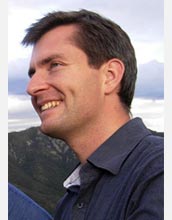|

Press Release 09-037
NSF Announces 2009 Alan T. Waterman Award Recipient

Harvard Astronomer David Charbonneau to be honored in May of this International Year of Astronomy
February 27, 2009
The National Science Foundation (NSF) is proud to announce that 34-year-old David Charbonneau, currently the Thomas D. Cabot Associate Professor of Astronomy at Harvard University, will receive its 2009 Alan T. Waterman Award. Discover Magazine's 2007 Scientist of the Year, Charbonneau's research focuses on the development of novel techniques for the detection and characterization of planets orbiting nearby Sun-like stars--extra-solar planets, also known as exoplanets. The annual Waterman award recognizes an outstanding young researcher in any field of science or engineering supported by NSF. Candidates may not be more than 35 years old, or seven years beyond receiving a doctorate, and must stand out for their individual achievements. In addition to a medal, the awardee receives a grant of $500,000 over a 3-year period for scientific research or advanced study in their field. "David Charbonneau is an extremely talented, young scientist," said NSF Director Arden L. Bement, Jr. "His selection is especially noteworthy in this International Year of Astronomy, as the world focuses on breakthroughs in astronomy and how these discoveries affect the lives of those on earth. Charbonneau is one of the best in his field, engaging in stellar research now and providing great hope for future discoveries as his research progresses along with his impressive career." As a graduate student in 1999, Charbonneau used a 10-centimeter (4-inch) telescope to make the first detection of an exoplanet eclipsing its parent star, which yielded the first ever constraint on the composition of a planet outside the solar system. He was a founding member of the Trans-Atlantic Exoplanet Survey, which used a worldwide network of small automated telescopes to survey hundreds of thousands of stars, discovering four more planetary systems through the eclipse technique. Charbonneau also pioneered the use of space-based observatories to undertake the first studies of the atmospheres of these distant worlds: In 2001 he used the Hubble Space Telescope to directly study the chemical make-up of the atmosphere enshrouding one of these exoplanets, and in 2005, he led the team that used the Spitzer Space Telescope to make the first direct detection of the light emitted by an exoplanet. He is a member of the NASA Kepler Team and is currently leading the NSF-funded MEarth Project. Each of these projects aims to detect Earth-like planets that might be suitable abodes for life beyond the Solar system. Charbonneau earned his doctorate in astronomy from Harvard University and his undergraduate degree in math and physics from the University of Toronto. In addition to winning the NSF's top award, Charbonneau has been awarded many distinctions through the years. In 2004, the Astronomical Society of the Pacific awarded him the Robert J. Trumpler Award for his graduate thesis entitled "Shadows and Reflections of Extrasolar Planets." He was recently named an Alfred P. Sloan Research Fellow (2006-2011), and awarded a David and Lucile Packard Fellowship for Science and Engineering (2006-2008), and the NASA Exceptional Scientific Achievement Medal (2006). Charbonneau will receive the medal at an awards dinner on May 13, 2009, at the U.S. Department of State, details for which are forthcoming.
-NSF-

Media Contacts
Lisa-Joy Zgorski, NSF (703) 292-8311 lisajoy@nsf.gov
Christine Pulliam, Harvard-Smithsonian Center for Astrophysics (617) 495-7463 cpulliam@cfa.harvard.edu
Terry Murphy, Harvard University, Office of News and Public Affairs (617) 495-1585 terry_murphy@harvard.edu
Program Contacts
Mayra N. Montrose, NSF (703) 292-4757 mmontros@nsf.gov
Related Websites
David Charbonneau's webpage: http://www.cfa.harvard.edu/~dcharbon/frames.html
General Information About Waterman Award and 2008 Recipient: http://www.nsf.gov/od/waterman/waterman.jsp
Press release announcing NSF's contributions to International Year of Astronomy 2009: http://www.nsf.gov/news/news_summ.jsp?cntn_id=113004

The National Science Foundation (NSF) is an independent federal agency that supports fundamental research and education across all fields of science and engineering. In fiscal year (FY) 2009, its budget is $9.5 billion, which includes $3.0 billion provided through the American Recovery and Reinvestment Act. NSF funds reach all 50 states through grants to over 1,900 universities and institutions. Each year, NSF receives about 44,400 competitive requests for funding, and makes over 11,500 new funding awards. NSF also awards over $400 million in professional and service contracts yearly.
 Get News Updates by Email Get News Updates by Email
Useful NSF Web Sites:
NSF Home Page: http://www.nsf.gov
NSF News: http://www.nsf.gov/news/
For the News Media: http://www.nsf.gov/news/newsroom.jsp
Science and Engineering Statistics: http://www.nsf.gov/statistics/
Awards Searches: http://www.nsf.gov/awardsearch/
| 


